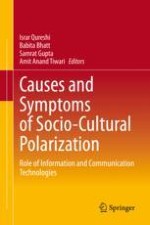2022 | OriginalPaper | Buchkapitel
Investigating Dynamics of Polarization of YouTube True and Fake News Channels
verfasst von : Manideepto Das, Priya Singh, Adrija Majumdar
Erschienen in: Causes and Symptoms of Socio-Cultural Polarization
Verlag: Springer Singapore
Aktivieren Sie unsere intelligente Suche, um passende Fachinhalte oder Patente zu finden.
Wählen Sie Textabschnitte aus um mit Künstlicher Intelligenz passenden Patente zu finden. powered by
Markieren Sie Textabschnitte, um KI-gestützt weitere passende Inhalte zu finden. powered by
